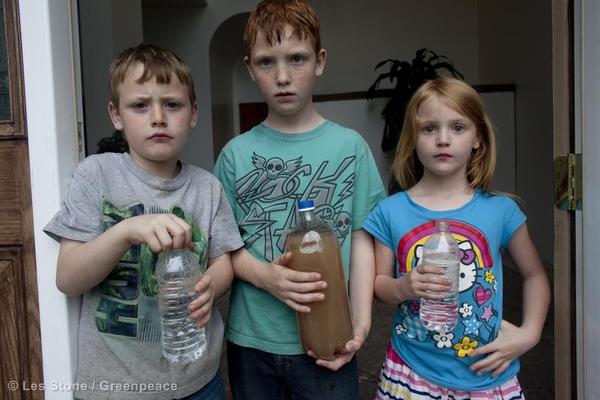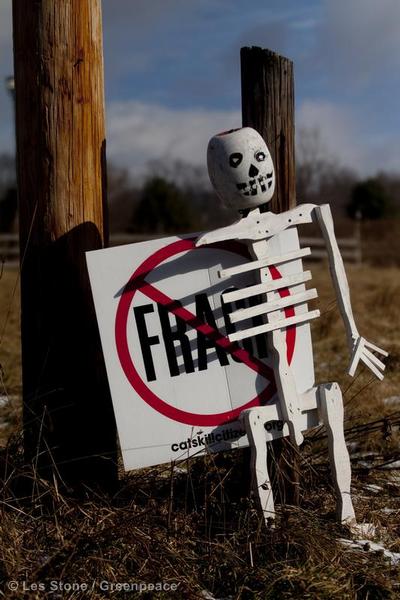By Phil Radford & Mark Ruffalo
Even the heads of fossil fuel companiesread the polls.They know the majority of Americans see global warming as an imminent threat and a clear sign that the way we use energy must change. But instead of offering the solar and wind choices America wants, fossil fuel companies like Shell, Exxon and Duke are offering what might be their most disastrous bait and switch yet: natural gas.
The bait? Burning natural gas is “clean” because it produces less carbon pollution than burning oil and coal. The switch? The catastrophic pollution caused when companies like Exxon fracture the earth — commonly called fracking — to get natural gas out of the ground.
These corporations know America is ready for change. They see motivated, forward-thinking companies likeApple, Google and Facebook committing to a clean energy future that threatens to leave dirty energy out in the cold, so they’ve done what they do best: come up with a slogan instead of a solution.
The industry, its investors and itsapologistsare insisting that the only way we can go from dirty to clean, oil and coal to solar and wind, is through its “bridge fuel,” natural gas.
The Bridge Fuel Club holds fast to the idea that the U.S. isn’t ready to transition to renewable energy.Despite overwhelming evidence to the contrary,the Bridge Fuel Club insists that the only way to get our carbon footprint to a manageable size in the long term is to go all-in on its next, best fossil fuel, one that happens tolight faucets on fireandleak methane into the atmosphereatastonishing rates. It’s not a real crisis, they say, it’s simply time for rebranding, from drilling to hydraulic fracturing.
In fracking, long horizontal wells are drilled in shale rocks sometimes a mile deep. Huge amounts of water, sand and chemicals are pumped into the wells at high pressure, which breaks open the shale so the trapped gas escapes to the surface.
If we listen to the Bridge Fuel Club, we’ll go from “spill, baby, spill” to “fracked” in no time — and put our long-term chances to solve the climate crisis in serious jeopardy.
Fracking protest catches agency’s eye
Swapping coal pollution for natural gas pollution is not a global warming solution. But companies like Exxon, Shell, and Duke want to use the urgency around climate emergencies like Hurricane Sandy and widespread drought to get us hooked on natural gas. Just like they’ve done for generations with their other fossil fuels, they want to privatize the profits while making us pay the costs of their work.

Lori New Breast of the Blackfoot Confederacy of Montana speaks in front of the U.S. Capitol against hydraulic fracturing for natural gas and the oil industry, during the Stop The Frack Attack Rally.
Unfortunately for the industry, the long-termsciencehas started rolling in, and it shows natural gas to be big trouble. Although burning natural gas has less impact on the climate than other fossil fuels, once you take into account the damage done from extraction, it’s clear natural gas is a lose-lose. In fact, methane pollution from natural gas has the potential to be an even more severe driver of global warming than carbon pollution from oil and coal. That means it’s a bridge fuel to nowhere.
The Environmental Protection Agency says natural gas is 21 times worse than carbon dioxide, but that alarming rate may in itself be a gross underestimate. Studies continue to show methane’s long-term climate impact may be far worse than initially predicted because of the intensity of methane’s interaction with aerosol in the atmosphere.
In addition,a recent study led by National Oceanic and Atmospheric Associationshowed that natural gas production sites in places like Utah and Colorado are leaking methane at “eye-popping” rates, far greater than what the industry reports.
But where the fossil fuel industry wants us to delay any work on clean energy while there is some fabricated doubt about climate change, it wants to go full frack ahead on natural gas — despite clear evidence against natural gas from the scientific community. Of course, for the industry, natural gas isn’t as much of an energy transition as a slight modification to its current business models, one that keeps all the subsidies and lobbyists right where they are.
For them, it seems like a slam dunk — except committed communities across the U.S. aren’t buying it.
Watch: ‘Avengers’ star Ruffalo is the ‘green monster fighting for the environment’

A crowd estimated by organizers to be 5,000 activists listened to speakers at the Capitol and then marched to the American Gas Association and American Petroleum Institute headquarters.
The industry is trying to bully the locals into giving up their land, pitting itself against New Yorkers, Ohioans, Illinoisians and Pennsylvanians. The movement’s momentum clearly has the industry on its back foot, so they’re trying new tactics like character assassination and slander.
By claiming that people across the social spectrum don’t like fracking simply because it’s happening in their backyards, the industry and its apologists are showing contempt for democracy in its rawest form.
In New York state, the resistance to fracking is grounded in communities most threatened by it. Mark’s family home is smack dab in the middle of what the fossil fuel industry wants to make the Gaslands of New York state. It’s a treasure of watersheds, developing organic food sources, and unindustrialized open spaces.
A vibrant and diversified community of farmers, craftspeople, artists, entrepreneurs, restaurant owners, tourism operators, and homeowners live there, all of whom would be devastated by the natural gas industry. This engaged community is demanding that there be no natural gas extraction on their lands until the long-term risks and dangers are fully understood.
These New Yorkers have seen other communities in neighboring states like Pennsylvania run over by an industry that promised them heaps of cash, but instead thecommunities report groundwater contamination, contaminated flow-back waste, road-ripping truck traffic and clouds of cancer-causing chemicals. As well as that, a recent report found that many of Pennsylvania’s energy policymakers and regulators havecome from the oil and gas industry.
Anti-fracking communities know that the barriers to clean energy are political, not practical. They want to see a better way. That’s why they are joined by many national environmental groups and activists from coast to coast, and also why the Bridge Fuel Club is so scared of them.
The more people who point out that natural gas is a bridge fuel to nowhere, the closer we get to a clean energy future.
Are you a New York resident? Tell Governor Andrew Cuomo to protect your state and say no to fracking!





